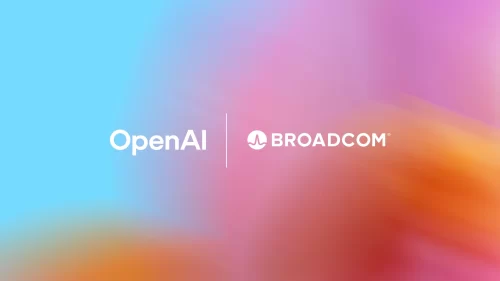
Relevance of a New Hardware Partner Brings for OpenAI?
OpenAI is accelerating its AI infrastructure ambitions with a massive new hardware partnership. The AI research lab has joined hands with semiconductor giant Broadcom to design and deploy 10 gigawatts of custom AI accelerator hardware — a move that underscores OpenAI’s growing appetite for computing power.
A New Wave of AI Hardware
The deal, announced on Monday, marks one of OpenAI’s biggest infrastructure expansions yet. The Broadcom-built AI accelerator racks will start rolling out in 2026 and continue through 2029, powering OpenAI’s data centers and those of its partners.
OpenAI said the partnership will allow it to design chips and systems that reflect its deep experience with large language models. “By designing its own chips and systems, the company can embed what it’s learned from developing frontier models and products directly into the hardware,” the company noted in its announcement.
A $500 Billion Bet on the Future of Intelligence
While OpenAI hasn’t disclosed the official terms, The Financial Times estimates the project could cost between $350 billion and $500 billion. If accurate, it would make this one of the most expensive hardware ventures ever undertaken in AI.
The investment reflects how central infrastructure has become to the company’s strategy. As AI models grow more powerful, so do their hardware demands. Custom-built systems like these could help OpenAI train and deploy next-generation AI models faster and more efficiently.
Building an AI Powerhouse
The Broadcom partnership is just the latest in a string of major infrastructure moves. Last week, OpenAI signed a deal with AMD to purchase an additional six gigawatts worth of chips — valued in the tens of billions.
In September, Nvidia announced a $100 billion investment in OpenAI and signed a letter of intent to provide 10 gigawatts of its own AI hardware. Around the same time, reports surfaced of a $300 billion cloud deal between OpenAI and Oracle, although neither company has confirmed it publicly.
Taken together, these deals signal that OpenAI is preparing for a massive scale-up in both compute and data capacity.
What It Means
OpenAI’s push into custom chips reflects a larger industry trend. As competition intensifies among AI labs, control over compute infrastructure is becoming a key advantage. Companies like Google, Amazon, and Meta already design their own chips to optimize performance and efficiency.
By entering this space, the company aims to reduce dependence on outside suppliers and tailor hardware specifically for its own models. This vertical integration could help it achieve faster innovation cycles and lower long-term costs.
What’s Next
With Broadcom on board, OpenAI’s data infrastructure could soon rival that of tech giants like Google and Amazon. The first hardware rollouts in 2026 will likely coincide with the next generation of OpenAI’s AI models, potentially setting new benchmarks for performance.
As AI systems continue to expand in scope and intelligence, OpenAI’s latest partnership shows how the race for compute power is reshaping the tech industry — chip by chip, watt by watt.
